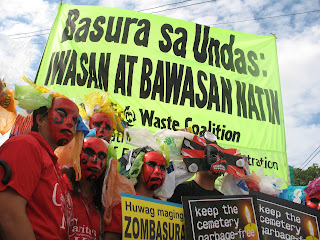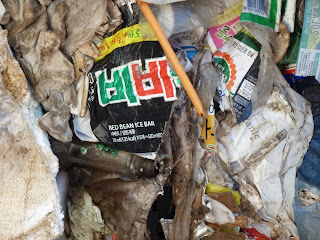Bishop, environmentalists urge La Loma Cemetery visitors to get rid of "Zombasura" habits


Environmental advocates from the church and the civil society today asked visitors to the oldest cemetery in Metro Manila not to turn into “Zombasura,” the notorious cemetery litterbugs.
In an event held at the main entrance of La Loma Catholic Cemetery, members of the EcoWaste Coalition and the Diocese of Kalookan Ecology Ministry reminded visitors to keep the historic burial site free of garbage.
Opened in 1884, the “Campo Santo de La Loma” is the resting place of many famous Filipinos, including the country’s first and second Supreme Court Chief Justices Cayetano Arellano and Victorino Mapa; Librada Avelino, founder of Centro Escolar University; Josefa Llanes Escoda, initiator of the Girl Scouts of the Philippines; and Felisa Dayrit, a revolutionary nurse.
“Zombasura” volunteers donning red and black masks embellished with assorted plastic waste welcomed cemetery visitors and encouraged them not to leave any trash in the nearly 54-hectare memorial park.
“I call upon the faithful to remember and pray for our dearly departed in a way that will not worsen the garbage problem in our communities,” said Bishop Deogracias S. Iñiguez, Jr. of the Diocese of Kalookan.
“I particularly urge those going to La Loma to help in keeping the cemetery litter-free,” he pleaded.
“Our time-honored tradition of remembering the dead should not defile our Mother Nature,” added Bishop Iñiguez who also heads the Public Affairs Committee of the Catholic Bishops' Conference of the Philippines.
The EcoWaste Coalition echoed the prelate’s plea for an ecological observance of “Undas,” stressing that cemeteries should not be treated as garbage disposal sites.
“La Loma and other cemeteries are not dumping grounds for our discards. We go there for the primary purpose of offering prayers of remembrance and gratitude to our deceased family members and friends,” said Romy Hidalgo, Vice-President, EcoWaste Coalition.
“Reckless disposal in the cemetery makes us ‘Zombasura,’ dirtying the hallowed site with trash,” he lamented.
“For a change, let us get rid of our ‘Zombasura’ habits, cut our waste size and be responsible for our discards,” he suggested.
To prevent and reduce waste and pollution in cemeteries, the EcoWaste Coalition proposes the following steps:
1. Walk, bike, carpool or take the public transportation to the cemeteries.
2. Select clean-burning candles that do not yield black fumes or ash. Lit a reasonable number only to minimize heat and pollution. Do not let candles’ plastic receptacles or holders to burn.
3. Offer local fresh flowers, not plastic ones, or consider bringing potted plants and flowers instead. Simple, inexpensive flowers will do. Avoid wrapping floral or plant offerings in plastic, which will sooner or later end up as trash.
4. Don’t play loud music, tone down noise in the cemetery, and help make the place conducive to prayers and to family bonding, too.
5. Bring your own water jug to avoid purchasing bottled water. Discarded plastic bottles add up to the country’s garbage problem. Plastics bottles, which are petrochemical products, also require lots of oil and chemicals to manufacture. Please watch The Story of Bottled Water to find out why: http://storyofstuff.org/bottledwater/
6. Go for waste-free meals. Say yes to reusable carriers, containers, and utensils such as lunchboxes and thermos, cloth napkins and silverwares. Say no to throw-away bags, wraps, foil or Styrofoam, paper napkins, and forks and spoons. Also, refrain from patronizing junk food and go for simple yet nutritious home-prepared baon.
7. Buy less or only as much as you know you will consume in terms of food and beverage. Bring bayong or other reusable bags to carry your stuff and purchases, and refuse plastic bags and wrappers from vendors.
8. Cut your waste size by not creating trash in the first place such as by purchasing products with the least amount of packaging and avoiding single-use plastic disposables.
9. Take full responsibility for your discards. Put them into the recycling bins and never litter. Better still, bring your own discards bags and bring them home for sorting, reusing, recycling or composting. Remember to leave the resting places of your loved ones litter-free.
"Let us show our respect for the dead and also for the living by keeping the cemeteries litter-free at all times. Please don't become a Zombasura this Undas," the EcoWaste Coalition appealed to the public.
-end-
EcoWaste Coalition
Unit 329, Eagle Court Condominium, Matalino St.
Quezon City, Philippines
+63 2 441-1846
ecowastecoalition@yahoo.com
In an event held at the main entrance of La Loma Catholic Cemetery, members of the EcoWaste Coalition and the Diocese of Kalookan Ecology Ministry reminded visitors to keep the historic burial site free of garbage.
Opened in 1884, the “Campo Santo de La Loma” is the resting place of many famous Filipinos, including the country’s first and second Supreme Court Chief Justices Cayetano Arellano and Victorino Mapa; Librada Avelino, founder of Centro Escolar University; Josefa Llanes Escoda, initiator of the Girl Scouts of the Philippines; and Felisa Dayrit, a revolutionary nurse.
“Zombasura” volunteers donning red and black masks embellished with assorted plastic waste welcomed cemetery visitors and encouraged them not to leave any trash in the nearly 54-hectare memorial park.
“I call upon the faithful to remember and pray for our dearly departed in a way that will not worsen the garbage problem in our communities,” said Bishop Deogracias S. Iñiguez, Jr. of the Diocese of Kalookan.
“I particularly urge those going to La Loma to help in keeping the cemetery litter-free,” he pleaded.
“Our time-honored tradition of remembering the dead should not defile our Mother Nature,” added Bishop Iñiguez who also heads the Public Affairs Committee of the Catholic Bishops' Conference of the Philippines.
The EcoWaste Coalition echoed the prelate’s plea for an ecological observance of “Undas,” stressing that cemeteries should not be treated as garbage disposal sites.
“La Loma and other cemeteries are not dumping grounds for our discards. We go there for the primary purpose of offering prayers of remembrance and gratitude to our deceased family members and friends,” said Romy Hidalgo, Vice-President, EcoWaste Coalition.
“Reckless disposal in the cemetery makes us ‘Zombasura,’ dirtying the hallowed site with trash,” he lamented.
“For a change, let us get rid of our ‘Zombasura’ habits, cut our waste size and be responsible for our discards,” he suggested.
To prevent and reduce waste and pollution in cemeteries, the EcoWaste Coalition proposes the following steps:
1. Walk, bike, carpool or take the public transportation to the cemeteries.
2. Select clean-burning candles that do not yield black fumes or ash. Lit a reasonable number only to minimize heat and pollution. Do not let candles’ plastic receptacles or holders to burn.
3. Offer local fresh flowers, not plastic ones, or consider bringing potted plants and flowers instead. Simple, inexpensive flowers will do. Avoid wrapping floral or plant offerings in plastic, which will sooner or later end up as trash.
4. Don’t play loud music, tone down noise in the cemetery, and help make the place conducive to prayers and to family bonding, too.
5. Bring your own water jug to avoid purchasing bottled water. Discarded plastic bottles add up to the country’s garbage problem. Plastics bottles, which are petrochemical products, also require lots of oil and chemicals to manufacture. Please watch The Story of Bottled Water to find out why: http://storyofstuff.org/bottledwater/
6. Go for waste-free meals. Say yes to reusable carriers, containers, and utensils such as lunchboxes and thermos, cloth napkins and silverwares. Say no to throw-away bags, wraps, foil or Styrofoam, paper napkins, and forks and spoons. Also, refrain from patronizing junk food and go for simple yet nutritious home-prepared baon.
7. Buy less or only as much as you know you will consume in terms of food and beverage. Bring bayong or other reusable bags to carry your stuff and purchases, and refuse plastic bags and wrappers from vendors.
8. Cut your waste size by not creating trash in the first place such as by purchasing products with the least amount of packaging and avoiding single-use plastic disposables.
9. Take full responsibility for your discards. Put them into the recycling bins and never litter. Better still, bring your own discards bags and bring them home for sorting, reusing, recycling or composting. Remember to leave the resting places of your loved ones litter-free.
"Let us show our respect for the dead and also for the living by keeping the cemeteries litter-free at all times. Please don't become a Zombasura this Undas," the EcoWaste Coalition appealed to the public.
-end-
EcoWaste Coalition
Unit 329, Eagle Court Condominium, Matalino St.
Quezon City, Philippines
+63 2 441-1846
ecowastecoalition@yahoo.com




Comments